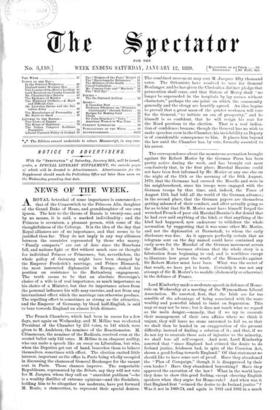The French Chambers, which had been in recess for a
few days, met again on Wednesday, and M. Menne was re-elected President of the Chamber by 253 votes, to 141 which were given to M. Andrieux, the nominee of the Reactionaries. M. Clemenceau, the nominee of the Radicals, received even at the second ballot only 122 votes. M. Maine is an eloquent nullity, who can make a speech like an essay on Liberalism, but who, when the Deputies get out of hand, beseeches them to behave themselves, sometimes with effect. The election excited little interest, important as the office is, Paris being wholly occupied in discussing the chances of General Boulanger for the vacant seat in Paris. Those chances improve. The respectable Republicans, represented by the Debats, say they will not vote for M. Jacques, whom they call an "anarchist publican "—he is a wealthy distiller of extreme opinions—and the Socialists, holding him to be altogether too moderate, have put forward M. Bottle, a stonecutter, to represent their special desires. The combined movement may cost M. Jacques fifty thousand votes. The Orleanists have resolved to vote for General Boula,nger, and he has given the Clericals a distinct pledge that persecution shall cease, and that Sisters of Mercy shall "no longer be superseded in the hospitals by lay nurses without characters," perhaps the one point on which the community generally and the clergy are heartily agreed. An idea begins to prevail that a great mass of the quieter work men will vote for the General, "to initiate an era of prosperity," and he himself is so confident, that he will resign his seat for the Nord previous to the election. That is a real indica- tion of confidence, because, though the General has no wish to make speeches even in the Chamber, his inviolability as Deputy is of considerable consequence to him. It places him beyond the law until the Chamber has, by vote, formally assented to his arrest.






































